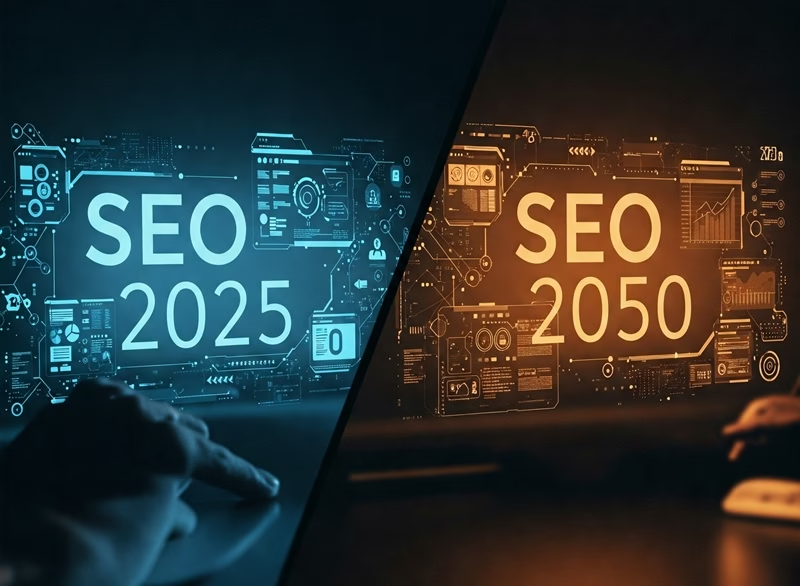
What if someone asks you about SEO for the future year? How will you say? Let’s predict. By 2050, technology like AI, voice search, and neural interfaces will radically transform how we interact with information. For a time travel proof SEO, we must consider the core SEO tenets—intent, relevance, and user experience (UX). They will remain foundational, even as their execution evolves.
It means that we should not forget the three tenets every time we optimize our website and content. Because they will remain essential in 2025, 2030, or even 2050.
What are they, and why will they matter for years to come for search engine optimization?
Intent: It refers to understanding what the person is actually looking for when he or she searches. Is it informational, transactional, or navigational? Search engines provide results that best satisfy user intent. Understanding the search intent helps us to create relevant and useful content to rank in higher positions. (More about intent)
Relevance: How closely does our content match the search query and the searcher’s needs? Is it able to answer the query? If it boosts engagement and reduces bounce rates, it signals quality to search engines and gives strong rankings. (More about relevance)
User Experience (UX): It measures how easy and enjoyable it is for visitors to interact with a website. UX includes elements like speed, design, navigation, and mobile-friendliness. Good UX gives an enjoyable experience and increases time spent on site and conversions. On the other hand, bad UX gives a frustrating experience to visitors and doesn’t align with search engines’ focus on user satisfaction. (More on UX)
These factors will be core SEO principles for years to come as they ensure search results remain valuable, accurate, and user-centric.
Ranking in 2050 Using 2025 SEO Principles
Let’s walk with time-travel proof SEO. This is from my beliefs, based on various experts’ thoughts. No one can predict exactly. The article is just to highlight the core tenets that will remain unchanged in your strategy in the future.

1. AI Evolution: From Predictive to Proactive Intelligence
2050 Scenario
AI will shift from reactive tools (e.g., chatbots, RankBrain) to proactive, context-aware systems that act in advance using real-time data, emotions, and personal context. Imagine how AI may book flights or diagnose health issues before you consciously search for a solution.
Impact on SEO
- Intent: SEO will focus on anticipation. (e.g., optimizing for “I need a gluten-free restaurant nearby” before the user types it).
- Relevance: Your content must align with AI-driven personalization, leveraging structured data (schema markup) and entity associations in it to signal expertise.
- UX: Speed and accessibility will still matter, but AI may prioritize “zero-click” answers or direct integrations in the SERPs. (e.g., booking a hotel via voice command from the Google result without visiting a site).
For example, if you are a travel brand, you can optimize for AI agents by embedding real-time availability and personalized offers into your knowledge graph.

2. Voice Search: From Commands to Conversational Context
2050 Scenario
Voice interfaces will become as human conversation, supporting multi-turn dialogues across augmented reality (AR) glasses, cars, and IoT devices. People might ask: “What’s the weather tomorrow? Can I reschedule my hike?”
Impact on SEO
- Intent: Long-tail, conversational queries will dominate. SEO will focus on topic clusters instead of single keywords (e.g., optimizing “beginner hiking tips + gear checklist + local trails” instead of a single search term).
- Relevance: Content must cover the topic comprehensively, answer follow-ups, and maintain consistency. FAQ pages and dynamic content (e.g., AI-generated summaries) will thrive.
- UX: Seamless voice navigation and clear, concise answers will remain critical. Optimization for featured snippets will remain essential.
For example, if you are a fitness brand, you have to optimize content for voice searches that adapts to someone’s fitness level and goals during a live workout session.

3. Neural Interfaces: From Screens to Thoughts
2050 Scenario
Direct brain-computer interfaces (BCIs) could enable thought-based search without a keyboard or voice. A user might think a query in his mind and receive it via AR overlays or neural feedback.
Impact on SEO
- Intent: SEO will target implicit intent (e.g., stress levels detected by BCIs triggering mindfulness content).
- Relevance: Content must be hyper-contextual, leveraging biometric data (e.g., location, heart rate) to deliver precise answers.
- UX: Traditional websites may lose their presence, but immersive, adaptive experiences (e.g., AR tutorials) will dominate. Page speed evolves to neural latency – the speed of processing info in the brain.
For example, a cooking brand might optimize for BCIs by linking recipes to hunger cues or pantry inventory data.
Core SEO Tenets That Are Everlasting
Tools and interfaces may change over time, but these SEO principles will remain timeless:
Intent
- Why: You know people will always seek answers, even if they whisper, think, or use AI.
- Future-Proofing: Use topic modeling and behavioral data to map evolving search intent (e.g., “how-to” vs “why-did” queries).
Relevance
- Why: Systems—may be Google or neural AI—will reward content that best matches user needs. The systems are built to satisfy users.
- Future-Proofing: Structure content around entities, not keywords (e.g., “Eiffel Tower” + “history” + “tickets”).
User Experience
- Why: Frictionless interactions will be non-negotiable, whether via voice, AR, or BCIs.
- Future-Proofing: Improve accessibility (e.g., voice navigation for the visually impaired) and adaptive design.
Conclusion
In 2050, SEO will look unrecognizable superficially. You will optimize for AI agents, voice-first workflows, and neural interfaces—but it will remain for solving user problems. Those who connect with intent, relevance, and UX will succeed, no matter how the technology shifts.
Prepare and continue with:
- Building content ecosystems (not just pages).
- Implementing schema markup and structured data.
- Designing for emerging interfaces (voice, AR, IoT).
The future is for those who can adapt methods while honoring principles.
Read another article on Timeless Link Building Techniques.
Resources for further reading:
→ Keyword research books & courses
→ How to optimize a blog post for search engines
→ How keyword clustering drives organic traffic
Disclosure: We are partners or associates of Amazon and other top brands. We may earn a small amount from qualifying purchases without increasing the price. Please read our full affiliate disclosure here.
Related posts:
- Ancient Wisdom for Modern SEO: 3 Timeless Principles for Discoverability
- The Stoic’s Guide to SEO: 3 Principles for Long Term Success
- Timeless Link Building Techniques: Your Guide to Organic Growth
- How to Migrate a WordPress Site to a New Host or Server Easily
- 7 Effective Link Building Techniques to Boost Domain Authority
